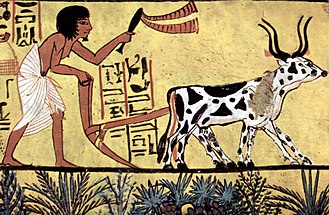Ancient Egyptian agriculture
Ancient Egyptian Agriculture was the backbone of the ancient Egyptian economy and a fundamental element in the success and wealth of the ancient civilization. It relied heavily on the Nile River's annual flooding, which deposited nutrient-rich silt on the banks, allowing the Egyptians to grow staple food crops and other commodities.
Overview
The Nile River was central to the development of agriculture in Egypt. The river's predictable flooding cycle, known as the inundation, occurred from June to September, depositing fresh layers of silt that enriched the soil. The Egyptians developed a sophisticated system of irrigation to control the floodwaters and extend the reach of the water to fields farther from the river.
Crops and Animals
The primary crops grown in ancient Egypt included wheat, barley, flax, and papyrus. Wheat and barley were staples in the Egyptian diet, used to make bread and beer, respectively. Flax was cultivated for its fibers, used in making linen for clothing, while papyrus was harvested for papermaking and construction materials.
In addition to crop farming, the Egyptians also engaged in animal husbandry, raising cattle, sheep, goats, and pigs. These animals provided meat, milk, leather, and wool, contributing to the Egyptians' diet and economy.
Agricultural Practices
Ancient Egyptian farmers employed a variety of agricultural practices to maximize their yields. They used simple tools, such as wooden plows and sickles, for plowing fields and harvesting crops. The shaduf, a hand-operated device for lifting water, was a significant innovation that improved irrigation.
Crop rotation and the use of manure as fertilizer were also common practices. These methods helped maintain soil fertility and reduce the risk of crop failure.
Economic and Social Impact
Agriculture was not only the economic foundation of ancient Egypt but also had a profound social impact. It supported the population's growth and enabled the development of complex social structures, including a stratified society with a powerful pharaoh at the top.
The surplus of food produced by efficient agricultural practices allowed for the emergence of specialized professions, such as scribes, artisans, and priests. This specialization contributed to the cultural and technological advancements of ancient Egypt.
Religious Significance
Agriculture also had a deep religious significance in ancient Egypt. The Egyptians believed that the flooding of the Nile was a gift from the gods, particularly Osiris, the god of fertility and agriculture. Numerous festivals and rituals were centered around the agricultural cycle, emphasizing the connection between the divine and the prosperity of the land.
Conclusion
Ancient Egyptian agriculture was a marvel of the ancient world, showcasing the Egyptians' ingenuity and their ability to adapt to their environment. It was a cornerstone of their economy, a source of their wealth, and a fundamental part of their society and culture. The legacy of ancient Egyptian agriculture continues to fascinate scholars and laypeople alike, offering insights into one of history's most enduring civilizations.
 This Ancient Egypt related article is a stub. You can help WikiMD by expanding it.
This Ancient Egypt related article is a stub. You can help WikiMD by expanding it.
Transform your life with W8MD's budget GLP-1 injections from $125.
W8MD offers a medical weight loss program to lose weight in Philadelphia. Our physician-supervised medical weight loss provides:
- Most insurances accepted or discounted self-pay rates. We will obtain insurance prior authorizations if needed.
- Generic GLP1 weight loss injections from $125 for the starting dose.
- Also offer prescription weight loss medications including Phentermine, Qsymia, Diethylpropion, Contrave etc.
NYC weight loss doctor appointments
Start your NYC weight loss journey today at our NYC medical weight loss and Philadelphia medical weight loss clinics.
- Call 718-946-5500 to lose weight in NYC or for medical weight loss in Philadelphia 215-676-2334.
- Tags:NYC medical weight loss, Philadelphia lose weight Zepbound NYC, Budget GLP1 weight loss injections, Wegovy Philadelphia, Wegovy NYC, Philadelphia medical weight loss, Brookly weight loss and Wegovy NYC
|
WikiMD's Wellness Encyclopedia |
| Let Food Be Thy Medicine Medicine Thy Food - Hippocrates |
Medical Disclaimer: WikiMD is not a substitute for professional medical advice. The information on WikiMD is provided as an information resource only, may be incorrect, outdated or misleading, and is not to be used or relied on for any diagnostic or treatment purposes. Please consult your health care provider before making any healthcare decisions or for guidance about a specific medical condition. WikiMD expressly disclaims responsibility, and shall have no liability, for any damages, loss, injury, or liability whatsoever suffered as a result of your reliance on the information contained in this site. By visiting this site you agree to the foregoing terms and conditions, which may from time to time be changed or supplemented by WikiMD. If you do not agree to the foregoing terms and conditions, you should not enter or use this site. See full disclaimer.
Credits:Most images are courtesy of Wikimedia commons, and templates, categories Wikipedia, licensed under CC BY SA or similar.
Contributors: Prab R. Tumpati, MD




